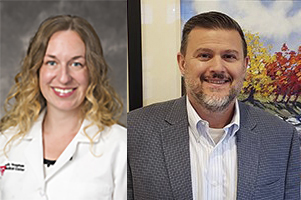Innovating Care for Long-Haul COVID Clinic Patients at UH Rainbow
June 13, 2022
“Dinner with the Doc” honorees Amy Edwards, MD, and David Miller, MD, provide excellence in patient care as directors of the UH Covid Long Haul Clinic for children
UH Clinical Update | June 2022
They are the children left behind.
 Amy Edwards, MD and David MIller, MD
Amy Edwards, MD and David MIller, MDThat is how a recent story by Bloomberg.com describes the patients treated by Dr. Amy Edwards and Dr. David Miller and their colleagues in the University Hospitals COVID Long Haul Clinic for Children, as well as at other such pediatric clinics around the country.
As their colleague Sally Ibrahim, MD, Director of Pediatric Sleep Medicine at UH Rainbow Babies & Children’s Hospital says of Dr. Edwards and Dr. Miller, “These two have selflessly cared for a vulnerable population. The patients in this clinic have multiple symptoms, some without clear cause or treatment, and much of Dr. Miller’s and Dr. Edwards’ time is used to simply listen and validate the care and concerns of their families.”
They see each patient as an individual, she adds, “And they incorporate the highest compassion with their care.”
Dr. Miller is the Medical Director of Pediatric Integrative Health at UH Connor Whole Health, and sees patients at UH Rainbow Babies’ & Children’s, as does Dr. Edwards, who is a Pediatric Infectious Disease Specialist.
The recent Bloomberg.com article, which prominently featured University Hospitals, noted that at least a half-million children in the U.S. are struggling with the mysterious disease, even as many adults seem to have the inaccurate impression that the pandemic is over. While the National Institutes of Health continues to work on answering questions about long COVID and how and why it affects a percentage of children and adults, those findings likely won’t be available for at least two years.
In the meantime, there are reports of pediatricians who aren’t taking the health complaints and symptoms of young patients seriously. These doctors are skeptical, and wonder if these are kids who just want to avoid school.
As Dr. Miller, a pediatric integrative medicine specialist has pointed out, “They’re told, ‘It’s all in your head. You’re just depressed.’ But now we have so many of them.”
Physicians aren’t the only people who express skepticism, Dr. Edwards says.
“We see a lot of parents, teachers and pediatricians who are in complete denial that children can get COVID long-haul, but David and I see these kids come in week after week and they all have very similar symptom patterns that have been clear and easy to identify,” she says. “I have had more than one adult ask me ‘But how do I know they aren’t just making it up for attention, or to get out of school – or ‘insert whatever excuse’ here –?’
“And my response is that they would all have to be making up the same types of symptoms, many of which seem unrelated to each other, so how would kids know how to make that up so consistently? Instead of assuming these kids are lying, we need to come together to help them so they can live their best lives.”
Children can have a hard time describing their symptoms, no matter what illness they suffer from. When it comes to long COVID, though, the most frequent complaint is fatigue, followed by pain. Having an altered sense of taste or smell is also common, as is having a hard time paying attention. Pediatric physicians say all that can vary, though, with different symptoms affecting different systems in the body. Also, symptoms might not occur until several weeks after the child’s initial COVID-19 infection.
At UH Rainbow, a number of patients have found that their stomach muscles hurt when slightly pressed, even when they haven’t had abdominal pain before. “The strange thing is how consistent it is,” says Dr. Edwards.
While COVID-19 deaths among children are rare, more than 1,000 children have died, and early this year, it was the fourth leading cause of death in children in the U.S. Doctors at children’s hospitals around the country are seeing an ever-growing number of post-infection patients.
With so much still unknown, treating pediatric long-haul COVID-19 patients is challenging, but the way Dr. Edwards and Dr. Miller care for their patients is noteworthy, says Dr. Ibrahim in her nomination of both of them for their “Dinner with the Doc” award.
“These physicians are upholding their oath to treat their patients with a steadfast commitment and provide a much needed empathy for their suffering,” she says. “They have fostered a well-being holistic care model, ensuring a personalized approach for each patient and family.
“Families tell me how much they feel valued, how they appreciate belonging to a clinic that truly cares for their families as they live with a new ‘normal.’ They trust Drs. Edwards and Miller, who embody integrity and commitment and deserve the highest honors.”


